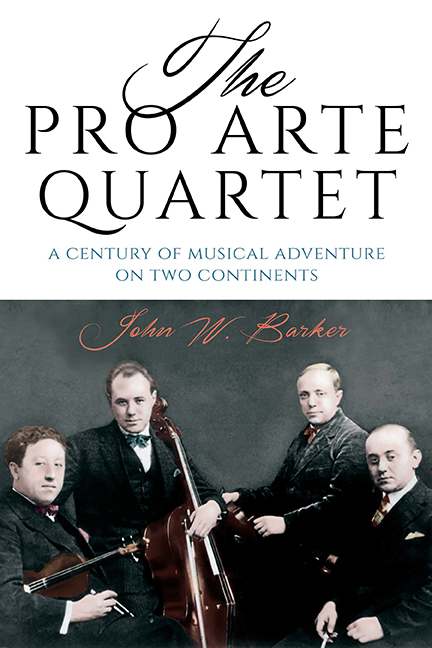Book contents
- Frontmatter
- Dedication
- Contents
- Preface
- Lists of Quartet Membership
- Introduction: Quartet Contexts
- 1 The Onnou Years, I (1912–31)
- 2 The Onnou Years, II (1932–40)
- 3 The Brosa Years (1940–44)
- 4 The Kolisch Years (1944–67)
- 5 The Paulu Years, I (1967–79)
- 6 The Paulu Years, II (1979–95)
- 7 The Perry Years (1995–Present)
- Conclusion: Retrospect and Prospects
- Appendixes
- Selected Bibliography
- Index A Composers
- Index B General
C - The Contemporary Music Project (1984–86)
Published online by Cambridge University Press: 10 June 2021
- Frontmatter
- Dedication
- Contents
- Preface
- Lists of Quartet Membership
- Introduction: Quartet Contexts
- 1 The Onnou Years, I (1912–31)
- 2 The Onnou Years, II (1932–40)
- 3 The Brosa Years (1940–44)
- 4 The Kolisch Years (1944–67)
- 5 The Paulu Years, I (1967–79)
- 6 The Paulu Years, II (1979–95)
- 7 The Perry Years (1995–Present)
- Conclusion: Retrospect and Prospects
- Appendixes
- Selected Bibliography
- Index A Composers
- Index B General
Summary
In the autumn of 1984 the University of Wisconsin Graduate School awarded the Pro Arte a grant enabling it to solicit submissions of chamber compositions, in line with the group's intense commitment to new music. The scores submitted would be studied by the quartet, and any deemed worthy of attention could be programmed for performance. A small advertisement was placed in one musical journal, with the expectation that the response would be modest. Instead, an eventual total of 150 submissions were made by 147 composers (some submitting two or more compositions). A number of submissions were belated, but are reckoned among the total elicited by the announcement.
The list of submissions is given below. It is interesting simply for the range of composers who responded, which varies from totally obscure musicians to composers of very considerable stature by that time—e.g., Milton Babbitt, John Cage, Henry Cowell, George Crumb, Ross Lee Finney, Otto Leuning, Quincy Porter, Seymour Shifrin (posthumously), Karl Weigl (also posthumously), and Charles Wuorinen, not to mention Igor Stravinsky's son Soulima. Some composers, too, were represented by other works in the quartet's programs. Perusal of the names on the list reveals a number of curiosities. Noticeable is the large number of Czech and Slovak composers who made submissions— an indication of the contacts that Paulu and his quartet had developed with that musical world, and a harbinger of the group's later tour there in October of 1987.
As it worked out, only two works (one each by Fred Lerdahl and Elliot Weisgarber) can be traced in subsequent Pro Arte programs. A capstone to the project came in June 2–14, 1986, when the quartet launched what ws titled “The First Contemporary String Quartet Symposium and Festival in Madison.” (In point of fact, there never was a “Second” or any other such event.) Guest participants in this gathering proved to have no relation those who had submitted scores made a year-and-a-half before. The composers involved were: Stephen Dembski (of the UW faculty), Ramon Zupko of Kalamazoo, Michigan; Thomas Oboe Lee of West Somerville, Massachusetts; Richard Moryl of Roxbury, Connecticut; John Lennon of Knoxville Tennessee; Mario Pelosi of Portland, Oregon; Daniel Perlongo of Indians, Pennsylvania, and Charles Porter of Brooklyn, New York. Also participating were two “laureate” composers, Karel Husa and Andrew Imbrie.
- Type
- Chapter
- Information
- The Pro Arte QuartetA Century of Musical Adventure on Two Continents, pp. 269 - 273Publisher: Boydell & BrewerPrint publication year: 2017

